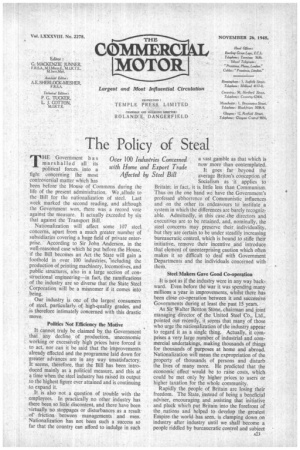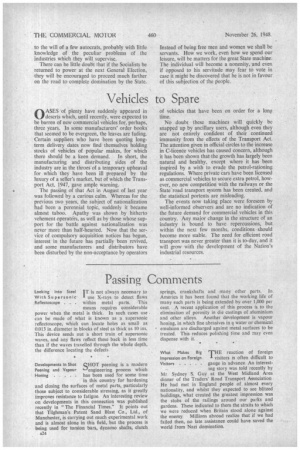The Policy of Steal
Page 25

Page 26

If you've noticed an error in this article please click here to report it so we can fix it.
Over 100 Industries Concerned with Home and Export Trade Affected by Steel Bill
THE Government h a s marshalled all its political forces., into a fight concerning the most controversial matter which has been before the House of Commons during the life of the present administration. We .allude to the Bill for the nationalization of steel. Last week marked the second reading, and although the Government won, there was a record vote against the measure. It actually exceeded by six that against the Transport Bill.
Nationalization will affect some 107 steel, concerns, apart from a much greater number of subsidiaries covering a huge field of private enterprise. According to Sir John Anderson, in the well-reasoned case which he put before the House, if the Bill becomes an Act the State will gain a foothold in over 100 industries, 'including the production of printing machinery, locomotives, and public structures, also in a large section of constructional engineering—in fact, the ramifications of the industry are so diverse that the State Steel Corporation will be a misnomer if it comes into being.
Our industry is one of the largest consumers of steel, particularly of high-quality grades, and is therefore intimately concerned with this drastic move.
Politics Not Efficiency the Motive It cannot truly be claimed by the Government that any decline of production, uneconomic working or excessively high prices have forced it to act, nor can it be said that the improvements already effected and the programme laid down for greater advances are in any way unsatisfactory. It seems, therefore, that the Bill has been introduced mainly as a political measure, and this at a time when the steel industry has raised its output to the highest figure ever attained and is continuing to, expand it.
It is also not a question of trouble with the employees. In practically no other industry has there been so little discontent, and there have been virtually no stoppages or disturbances as a result ot friction between managements and men. Nationalization has not been such a success so far that the country can afford to indulge in such a vast gamble as that which is now ,more than contemplated.
It goes far beyond the average Briton's conception of Socialism as -it applies to Britain; in fact, it is little less than Communism. Thus on the one hand we have the Government's professed abhorrence of Communistic influences and on the other its. endeavours to institute a system in which the differences are barely recognizable. Admittedly, in this case -the directors and executives are to be retained, and, nominally, the steel concerns may preserve their individuality. but they are certain to be under steadily increasing bureaucratic control, which is bound to stifle their initiative, remove their incentive and introduce that element of unenterprising caution which often makes it so difficult to deaf with GovernMent Departments and the individuals concerned with them. "
Steel Makers Gave Good Co-operation It is not as if the industry were in any way backward. Even before the war it was _spending many millions a year in improvements, whilst there has been close co-operation between it and successive Governments during at least the past 15 years.
As Sir Walter Benton Stone, chairman and joint managing director of the United Steel Co., Ltd., pointed out recently, it seems that many of those who urge the nationalization of the industry appear to regard it as a single thing. Actually, it comprises a very large number of industrial and commercial undertakings, making thousands of things for thousands of purposes at home and abroad. Nationalization will mean the expropriation of the property of thousands of persons and disturb the lives of many more. He predicted that the economic` effect would be to raise costs, which could be met only by higher prices to users or higher'taxation for the whole community.
Rapidly the people of Britain are losing their freedom. The State, instead of being a beneficial adviser, encouraging and assisting that initiative and pluck which put Britaininto the forefront of the nations and helped to develop the greatest Empire the world has seen. is clamping down on industry after industry until we shall become a people riddled by bureaucratic control and subject to the will of a few autocrats, probably with little knowledge of the peculiar problems of the industries which they will supervise.
There can be little doubt that if the Socialists be returned to power at the next General Election, they will be encouraged to proceed much farther on the road to complete domination by the State. Instead of being free men and women we shall be servants. How we work, even how we spend our leisure, will be matters for the great State machine. The individual will become a nonenity, and even if opposed to his servitude may fear to vote in case it might be discovered that he is not in favour of this subjection of the people.




















































































